Don't wanna be here? Send us removal request.
Text
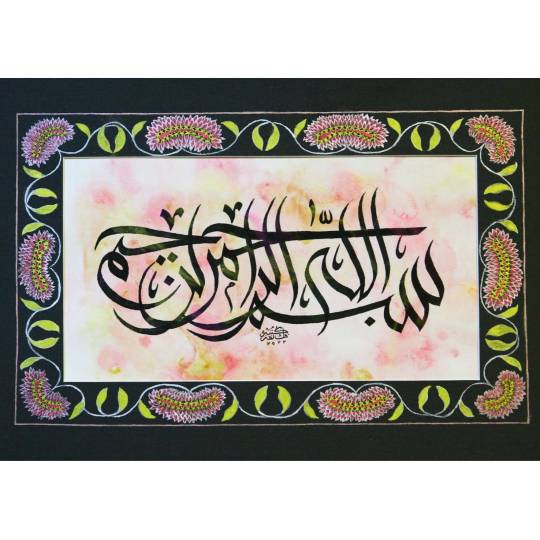
0 notes
Text
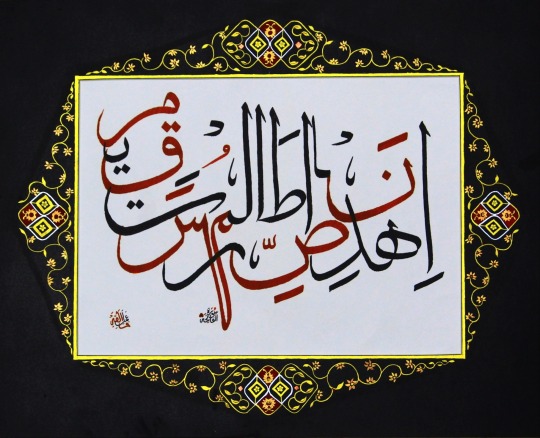
Al-Fatihah 1:6
ٱهْدِنَا ٱلصِّرَٰطَ ٱلْمُسْتَقِيمَ
Guide us to the straight path.
English - Tafsir Ibn Kathir
Guide us to the straight path.
The guidance mentioned in the Surah implies being directed and guided to success.
Allah said,
اهدِنَــــا الصِّرَاطَ المُستَقِيم
(Guide us to the straight path),
meaning guide, direct, lead and grant us the correct guidance.
Also,
وَهَدَيْنَـهُ النَّجْدَينِ
And shown him the two ways (good and evil), (90:10),
means, `We explained to him the paths of good and evil.'
Also, Allah said,
اجْتَبَـهُ وَهَدَاهُ إِلَى صِرَطٍ مُّسْتَقِيمٍ
He (Allah) chose him (as an intimate friend) and guided him to a straight path, (16:121)
and,
فَاهْدُوهُمْ إِلَى صِرَطِ الْجَحِيمِ
And lead them on to the way of flaming Fire (Hell). (37:23)
Similarly, Allah said,
وَإِنَّكَ لَتَهْدِى إِلَى صِرَطٍ مُّسْتَقِيمٍ
And verily, you (O Muhammad) are indeed guiding (mankind) to the straight path. (42:52)
and,
الْحَمْدُ لِلَّهِ الَّذِى هَدَانَا لِهَـذَا
All praise and thanks be to Allah, Who has guided us to this. (7:43)
meaning, guided us and directed us and qualified us for this end - Paradise.
The Meaning of As-Sirat Al-Mustaqim, the Straight Path
As for the meaning of As-Sirat Al-Mustaqim, Imam Abu Jafar At-Tabari said,
"The Ummah agreed that Sirat Al-Mustaqim, is the clear path without branches, according to the language of the Arabs. For instance, Jarir bin `Atiyah Al-Khatafi said in a poem,
`The Leader of the faithful is on a path that will remain straight even though the other paths are crooked."
At-Tabari also stated that, "There are many evidences to this fact."
At-Tabari then proceeded,
"The Arabs use the term, Sirat in reference to every deed and statement whether righteous or wicked. Hence the Arabs would describe the honest person as being straight and the wicked person as being crooked.
The straight path mentioned in the Qur'an refers to Islam."
Imam Ahmad recorded in his Musnad that An-Nawwas bin Sam`an said that the Prophet said,
ضَرَبَ اللهُ مَثَلً
صِرَاطًا مُسْتَقِيمًا وَعَلَى جَنْبَتَيِ الصِّرَاطِ سُورَانِ فِيهِمَا أَبْوَابٌ مُفَتَّحَةٌ وَعَلَى الاَْبْوَابِ سُتُورٌ مُرْخَاةٌ وَعَلَى بَابِ الصِّرَاطِ دَاعٍ يَقُولُ
يَاأَيُّهَا النَّاسُ ادْخُلُوا الصِّرَاطَ جَمِيعًا وَلَاا تَعْوَجُّوا
وَدَاعٍ يَدْعُو مِنْ فَوْقِ الصِّرَاطِ فَإِذَا أَرَادَ الاِْنْسَانُ أَنْ يَفْتَحَ شَيْيًا مِنْ تِلْكَ الاَْبْوَابِ
قَالَ وَيْحَكَ لَاا تَفْتَحْهُ فَإِنَّكَ إِنْ فَتَحْتَهُ تَلِجْهُ
فَالصِّرَاطُ الاْاِسْلَامُ
وَالسُّورَانِ حُدُودُ اللهِ وَالاْاَبْوَابُ الْمُفَتَّحَةُ مَحَارِمُ اللهِ
وَذَلِكَ الدَّاعِي عَلَى رَأْسِ الصِّرَاطِ كِتَابُ اللهِ وَالدَّاعِي مِنْ فَوْقِ الصِّرَاطِ وَاعِظُ اللهِ فِي قَلْبِ كُلِّ مُسْلِمٍ
Allah has set an example:
a Sirat (straight path) that is surrounded by two walls on both sides, with several open doors within the walls covered with curtains. There is a caller on the gate of the Sirat who heralds,
'O people! Stay on the path and do not deviate from it.'
Meanwhile, a caller from above the path is also warning any person who wants to open any of these doors,
'Woe unto you! Do not open it, for if you open it you will pass through.'
- The straight path is Islam,
- the two walls are Allah's set limits,
- while the doors resemble what Allah has prohibited.
- The caller on the gate of the Sirat is the Book of Allah,
- while the caller above the Sirat is Allah's admonishment in the heart of every Muslim.
The Faithful ask for and abide by Guidance
If someone asks,
"Why does the believer ask Allah for guidance during every prayer and at other times, while he is already properly guided Has he not already acquired guidance?"
The answer to these questions is that if it were not a fact that the believer needs to keep asking for guidance day and night, Allah would not have directed him to invoke Him to acquire the guidance. The servant needs Allah the Exalted every hour of his life to help him remain firm on the path of guidance and to make him even more firm and persistent on it. The servant does not have the power to benefit or harm himself, except by Allah's permission. Therefore, Allah directed the servant to invoke Him constantly, so that He provides him with His aid and with firmness and success.
Indeed, the happy person is he whom Allah guides to ask of Him. This is especially the case if a person urgently needs Allah's help day or night.
Allah said,
يَـأَيُّهَا الَّذِينَ ءَامَنُواْ ءَامِنُواْ بِاللَّهِ وَرَسُولِهِ وَالْكِتَـبِ الَّذِى نَزَّلَ عَلَى رَسُولِهِ وَالْكِتَـبِ الَّذِى أَنَزلَ مِن قَبْلُ
O you who believe!
Believe in Allah, and His Messenger (Muhammad), and the Book (the Qur'an) which He has sent down to His Messenger, and the Scripture which He sent down to those before (him). (4:16)
Therefore, in this Ayah Allah commanded the believers to believe, and this command is not redundant since what is sought here is firmness and continuity of performing the deeds that help one remain on the path of faith.
Also, Allah commanded His believing servants to proclaim,
رَبَّنَا لَا تُزِغْ قُلُوبَنَا بَعْدَ إِذْ هَدَيْتَنَا وَهَبْ لَنَا مِن لَّدُنكَ رَحْمَةً إِنَّكَ أَنتَ الْوَهَّابُ
Our Lord!
Let not our hearts deviate (from the truth) after You have guided us, and grant us mercy from You. Truly, You are the Bestower. (3:8)
Hence,
اهدِنَــــا الصِّرَاطَ المُستَقِيم
(Guide us to the straight way) means,
"Make us firm on the path of guidance and do not allow us to deviate from it."
Allah then guides,
صِرَاطَ الَّذِينَ أَنعَمتَ عَلَيهِمْ غَيرِ المَغضُوبِ عَلَيهِمْ وَلَا الضَّالِّينَ
Guidance is of two kinds:
a) Guidance of Taufiq and it is totally from Allah, i.e. Allah opens one's heart to receive the truth (from disbelief to belief in Islamic Monotheism).
b) Guidance of Irshad through preaching by Allah's Messengers and pious preachers who preach the truth, i.e. Islamic Monotheism.
#Tafsir#Allah#Quran#AlFatiha#MotheroftherQuran#arabiccalligraphy#Arts#Khatati#Black#Metalliccolors#IbneKatheer#guidance#straight path#Gold#Islamicillumination
1 note
·
View note
Text
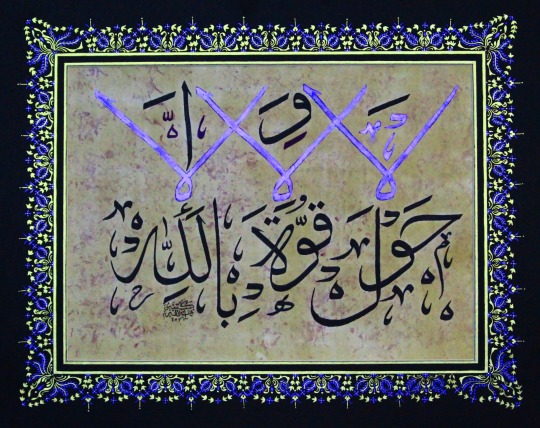
لا حول ولا قوة إلا بالله
0 notes
Text
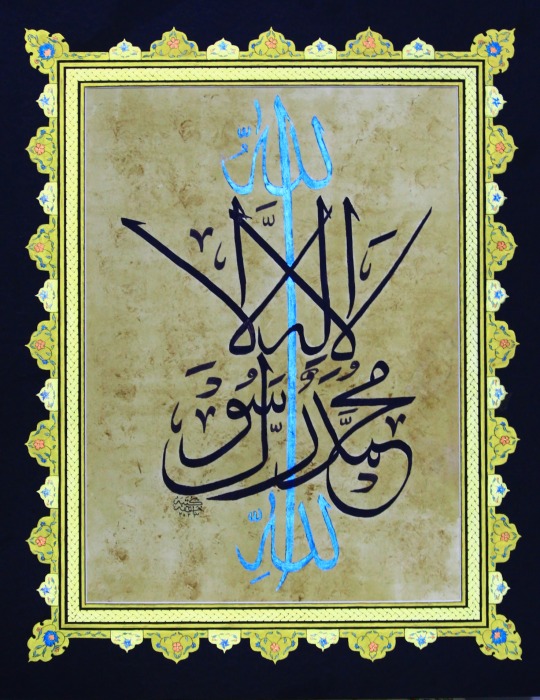
Kalima
لا إله الا الله محمد رسول الله
#Allah#Muhammad#Prophet#Islam#Arabiccalligraphy#Thuluth#manuscript#Gold#Zengerik#Illumination#Metalliccolors
0 notes
Text
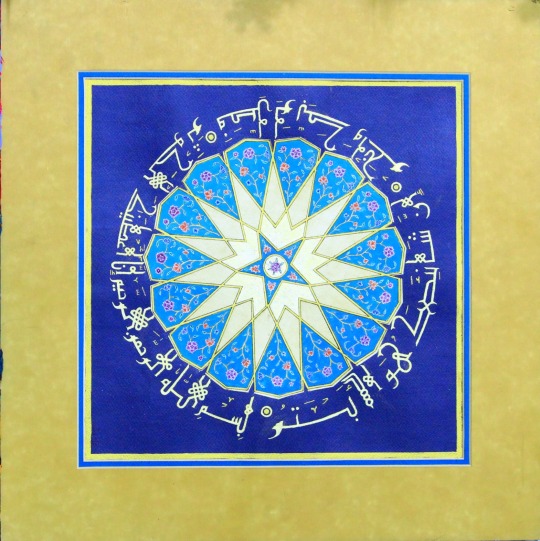
Quran
Al-Kawthar 108:1
إِنَّآ أَعْطَيْنَٰكَ ٱلْكَوْثَرَ
Indeed, We have granted you, [O Muḥammad], al-Kawthar.
Al-Kawthar 108:2
فَصَلِّ لِرَبِّكَ وَٱنْحَرْ
So pray to your Lord and offer sacrifice [to Him alone].
Al-Kawthar 108:3
إِنَّ شَانِئَكَ هُوَ ٱلْأَبْتَرُ
Indeed, your enemy is the one cut off.[1]
Muslim, Abu Dawud and An-Nasa'i, all recorded from Anas that he said,
"While we were with the Messenger of Allah in the Masjid, he dozed off into a slumber. Then he lifted his head smiling. We said, `O Messenger of Allah! What has caused you to laugh' He said, Verily, a Surah was just revealed to me. Then he recited,
إِنَّا أَعْطَيْنَاكَ الْكَوْثَرَ
فَصَلِّ لِرَبِّكَ وَانْحَرْ
إِنَّ شَانِيَكَ هُوَ الاٌّبْتَرُ
Verily, We have granted you Al-Kawthar.
Therefore turn in prayer to your Lord and sacrifice.
For he who hates you, he will be cut off.
Then he said,
Do you all know what is Al-Kawthar?
We said, `Allah and His Messenger know best.'
He said,
فَإِنَّهُ نَهَرٌ وَعَدَنِيهِ رَبِّي عَزَّ وَجَلَّ عَلَيْهِ خَيْرٌ كَثِيرٌ
هُوَ حَوْضٌ تَرِدُ عَلَيْهِ أُمَّتِي يَوْمَ الْقِيَامَةِ
انِيَتُهُ عَدَدُ النُّجُومِ فِي السَّمَاءِ
فَيُخْتَلَجُ الْعَبْدُ مِنْهُمْ فَأَقُولُ رَبِّ إِنَّهُ مِنْ أُمَّتِي
فَيَقُولُ إِنَّكَ لَا تَدْرِي مَا أَحْدَثَ بَعْدَك
Verily, it is a river that my Lord, the Mighty and Majestic, has promised me and it has abundant goodness.
It is a pond where my Ummah will be brought to on the Day of Judgement.
Its containers are as numerous as the stars in the sky.
Then a servant of Allah from among them will be (prevented from it) and I will say:
"O Lord! Verily, he is from my Ummah (followers)."
Then He (Allah) will say:
"Verily, you do not know what he introduced (or innovated) after you."
This is the wording of Muslim.
Ahmad recorded this Hadith from Muhammad bin Fudayl, who reported from Al-Mukhtar bin Fulful, who reported it from Anas bin Malik.
Imam Ahmad also recorded from Anas that the Messenger of Allah said,
دَخَلْتُ الْجَنَّةَ فَإِذَا أَنَا بِنَهْرٍ حَافَتَاهُ خِيَامُ اللُّوْلُوِ
فَضَرَبْتُ بِيَدِي إِلَى مَا يَجْرِي فِيهِ الْمَاءُ فَإِذَا مِسْكٌ أَذْفَرُ
قُلْتُ مَاهَذَا يَا جِبْرِيلُ
قَالَ هَذَا الْكَوْثَرُ الَّذِي أَعْطَاكَهُ اللهُ عَزَّ وَجَل
I entered Paradise and I came to a river whose banks had tents made of pearls. So I thrust my hand into its flowing water and found that it was the strongest (smell) of musk. So I asked, "O Jibril! What is this"
He replied,
"This is Al-Kawthar which Allah, the Mighty and Majestic has given you."
Al-Bukhari recorded this in his Sahih, and so did Muslim, on the authority of Anas bin Malik. In their version Anas said, "When the Prophet was taken up to the heaven, he said,
أَتَيْتُ عَلَى نَهْرٍ حَافَتَاهُ قِبَابُ اللُّوْلُوِ الْمُجَوَّفِ فَقُلْتُ مَا هَذَا يَا جِبْرِيلُ قَالَ هَذَا الْكَوْثَر
I came to a river whose banks had domes of hollowed pearl. I said:"O Jibril! What is this"
He replied:
"This is Al-Kawthar."
This is the wording of Al-Bukhari.
Ahmad recorded from Anas that a man said,
"O Messenger of Allah! What is Al-Kawthar?"
He replied,
هُوَ نَهْرٌ فِي الْجَنَّةِ أَعْطَانِيهِ رَبِّي
لَهُوَ أَشَدُّ بَيَاضًا مِنَ اللَّبَنِ وَأَحْلَى مِنَ الْعَسَلِ
فِيهِ طُيُورٌ أَعْنَاقُهَا كَأَعْنَاقِ الْجُزُر
It is a river in Paradise which my Lord has given me. It is whiter than milk and sweeter than honey. There are birds in it whose necks are (long) like carrots.
Umar said, "O Messenger of Allah! Verily, they (the birds) will be beautiful."
The Prophet replied,
اكِلُهَا أَنْعَمُ مِنْهَا يَا عُمَر
The one who eats them (i.e., the people of Paradise) will be more beautiful than them, O `Umar.
Al-Bukhari also recorded from Sa`id bin Jubayr that Ibn Abbas said,
"Al-Kawthar is the abundant goodness."
This explanation includes the river and other things as well. Because the word Al-Kawthar comes from the word Kathrah (abundance) and it (Al-Kawthar) linguistically means an abundance of goodness. So from this goodness is the river (in Paradise).
Imam Ahmad recorded from Ibn Umar that the Messenger of Allah said,
الْكَوْثَرُ نَهْرٌ فِي الْجَنَّةِ حَافَتَاهُ مِنْ ذَهَبٍ وَالْمَاءُ يَجْرِي عَلَى اللُّوْلُوِ
وَمَاوُهُ أَشَدُّ بَيَاضًا مِنَ اللَّبَنِ وَأَحْلَى مِنَ الْعَسَل
Al-Kawthar is a river in Paradise whose banks are of gold and it runs over pearls. Its water is whiter than milk and sweeter than honey.
This Hadith was recorded in this manner by At-Tirmidhi, Ibn Majah, Ibn Abi Hatim and Ibn Jarir.
At-Tirmidhi said, "Hasan Sahih."
Then Allah says,
فَصَلِّ لِرَبِّكَ وَانْحَرْ
Therefore turn in prayer to your Lord and sacrifice.
meaning, `just as We have given you the abundant goodness in this life and the Hereafter -- and from that is the river that has been described previously -- then make your obligatory and optional prayer, and your sacrifice (of animals) solely and sincerely for your Lord.
Worship Him alone and do not associate any partner with him. And sacrifice pronouncing His Name alone, without ascribing any partner to Him.'
This is as Allah says,
قُلْ إِنَّ صَلَتِى وَنُسُكِى وَمَحْيَاىَ وَمَمَاتِى للَّهِ رَبِّ الْعَـلَمِينَ
لَا شَرِيكَ لَهُ وَبِذَلِكَ أُمِرْتُ وَأَنَاْ أَوَّلُ الْمُسْلِمِينَ
Say:
"Verily, my Salah, my sacrifice, my living, and my dying are for Allah, the Lord of all that exists.
He has no partner. And of this I have been commanded, and I am the first of the Muslims." (6:162-163)
Allah says,
The Enemy of the Prophet is Cut Off
إِنَّ شَانِيَكَ هُوَ الاَْبْتَرُ
For he who hates you, he will be cut off.
meaning, `indeed he who hates you, O Muhammad, and he hates what you have come with of guidance, truth, clear proof and manifest light, he is the most cut off, meanest, lowliest person who will not be remembered.
Ibn `Abbas, Mujahid, Sa`id bin Jubayr and Qatadah all said,
"This Ayah was revealed about Al-As bin Wa'il. Whenever the Messenger of Allah would be mentioned (in his presence) he would say,
`Leave him, for indeed he is a man who is cut off having no descendants. So when he dies he will not be remembered.'
Therefore, Allah revealed this Surah."
Shamir bin `Atiyah said,
"This Surah was revealed concerning `Uqbah bin Abi Mu`ayt."
Ibn `Abbas and `Ikrimah have both said,
"This Surah was revealed about Ka`b bin Al-Ashraf and a group of the disbelievers of the Quraysh."
Al-Bazzar recorded that Ibn Abbas said,
"Ka`b bin Al-Ashraf came to Makkah and the Quraysh said to him,
`You are the leader of them (the people). What do you think about this worthless man who is cut off from his people He claims that he is better than us while we are the people of the place of pilgrimage, the people of custodianship (of the Ka`bah), and the people who supply water to the pilgrims.'
He replied, `You all are better than him.'
So Allah revealed, "
إِنَّ شَانِيَكَ هُوَ الاٌّبْتَرُ
(For he who hates you, he will be cut off.)"
This is how Al-Bazzar recorded this incident and its chain of narration is authentic.
It has been reported that Ata' said,
"This Surah was revealed about Abu Lahab when a son of the Messenger of Allah died. Abu Lahab went to the idolators and said,
`Muhammad has been cut off (i.e., from progeny) tonight.'
So concerning this Allah revealed, "
إِنَّ شَانِيَكَ هُوَ الاٌّبْتَرُ
(For he who hates you, he will be cut off.)"
As-Suddi said,
"When the male sons of a man died the people used to say, `He has been cut off.' So, when the sons of the Messenger of Allah died they said, `Muhammad has been cut off.'
Thus, Allah revealed, "
إِنَّ شَانِيَكَ هُوَ الاٌّبْتَرُ
(For he who hates you, he will be cut off.)"
So they thought in their ignorance that if his sons died, his remembrance would be cut off.
Allah forbid! To the contrary, Allah preserved his remembrance for all the world to see, and He obligated all the servants to follow his Law. This will continue for all of time until the Day of Gathering and the coming of the Hereafter. May the blessings of Allah and His peace be upon him forever until the Day of Assembling.
This is the end of the Tafsir of Surah Al-Kawthar, and all praise and blessings are due to Allah
Hadith-
Narrated Anas [radhi-yAllahu 'anhu]: The Prophet (ﷺ) said, "None of you will have Faith till he loves me more than his father, his children and all mankind."
[Sahih Al-Bukhari, 1/15 (O.P.14)]
#Quran#AlKawthar#Arabiccalligraphy#Kuficscript#Illumination#Gold#Goauche#paints#Artist#Calligraphypens#Calligrapher#Islam
0 notes
Text
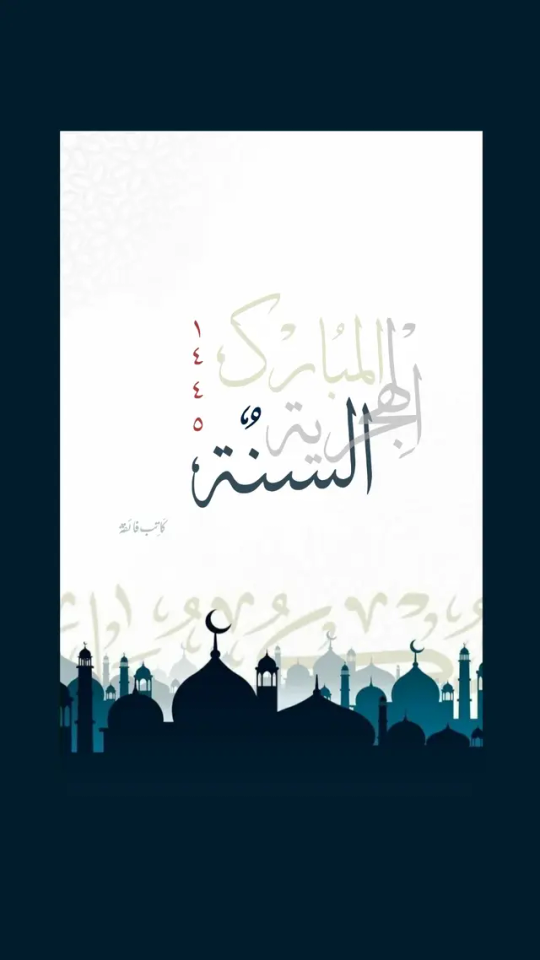
1 note
·
View note